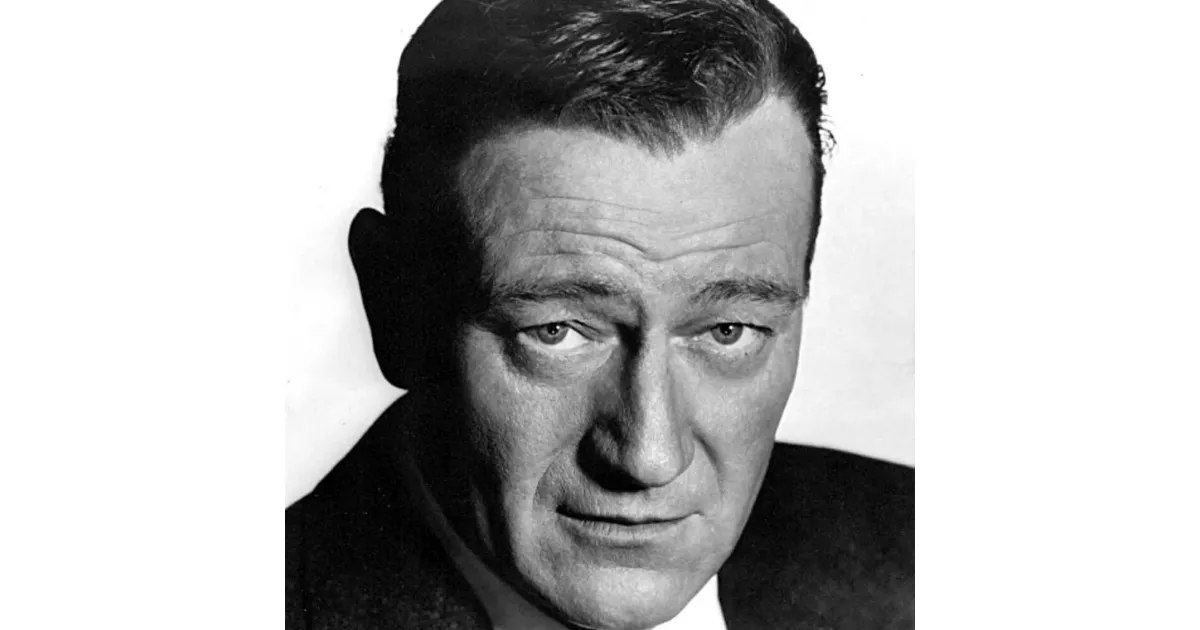How education and upbringing influenced the life of John Wayne. A timeline of key moments.
John Wayne, born Marion Robert Morrison and nicknamed "Duke," was a highly popular American actor. He rose to fame during Hollywood's Golden Age, primarily starring in Westerns and war movies. Wayne's career spanned from the silent era through the New Wave, with a total of 179 film and television appearances. He remained a top box-office draw for three decades, acting alongside many prominent stars. The American Film Institute recognized his significant contributions by naming him among the greatest male stars of classic American cinema.
May 26, 1907: Marion Robert Morrison Born
On May 26, 1907, Marion Robert Morrison, who would later be known as John Wayne, was born. He would become a famous American actor.
May 30, 1907: Report of Wayne's Birth
On May 30, 1907, the Winterset Madisonian reported on page 4 of their edition that Marion Robert Morrison, who would later be known as John Wayne, weighed 13 lb at birth.
1915: Death of Wayne's Grandfather
In 1915, Marion Mitchell Morrison, John Wayne's paternal grandfather who served in the Union army during the American Civil War, passed away.
1916: Family Moves to Glendale
In 1916, John Wayne's family moved to Glendale, California, where his father worked as a pharmacist.
1924: Played Football for Glendale High School
In 1924, John Wayne played football for the league champion Glendale High School team.
1934: Birth of Michael Wayne
In 1934, Michael Wayne, the first child of John Wayne and Josephine Alicia Saenz, was born.
1936: Voting for Roosevelt
In 1936, John Wayne voted for Democratic President Franklin D. Roosevelt in the presidential election.
1936: Birth of Mary Antonia "Toni" Wayne LaCava
In 1936, Mary Antonia "Toni" Wayne LaCava, the daughter of John Wayne and Josephine Alicia Saenz, was born.
1937: Death of Wayne's Father
In 1937, Clyde Leonard Morrison, John Wayne's father, passed away.
1938: Affair with Merle Oberon Begins
In 1938, John Wayne began a high-profile affair with Merle Oberon, which lasted until 1947.
1939: Birth of Patrick Wayne
In 1939, Patrick Wayne, the son of John Wayne and Josephine Alicia Saenz, was born.
1940: Birth of Melinda Wayne Munoz
In 1940, Melinda Wayne Munoz, the daughter of John Wayne and Josephine Alicia Saenz, was born.
1941: Pat Stacy Born
In 1941, Pat Stacy, who later became John Wayne's partner after his separation from Pilar, was born.
1943: First Time Seeing John Wayne
In 1943, Joan Didion recalls the first time she saw John Wayne in a movie, remembering the walk, the voice, and a line from the picture War of the Wildcats.
1943: Toured U.S. Bases in South Pacific
In 1943, John Wayne toured U.S. bases and hospitals in the South Pacific with the United Service Organizations (USO).
February 1944: Creating Motion Picture Alliance
In February 1944, John Wayne took part in creating the conservative Motion Picture Alliance for the Preservation of American Ideals.
1944: Toured U.S. Bases in South Pacific
In 1944, John Wayne toured U.S. bases and hospitals in the South Pacific with the United Service Organizations (USO).
1947: Esperanza's Attempted Shooting
In 1947, after the wrap party for 'Angel and the Badman', John Wayne's then-wife, Esperanza Baur, attempted to shoot him in a drunken rage due to suspicions of an affair with Gail Russell.
1947: Affair with Merle Oberon Ends
John Wayne's affair with Merle Oberon, which started in 1938, ended in 1947.
1948: Supporting Dewey
In 1948, John Wayne supported Republican candidate Thomas E. Dewey in the presidential election, despite admiring Democratic President Harry S. Truman.
1948: Wake of the Red Witch
In 1948, the film 'Wake of the Red Witch' was released, based on the novel by Garland Roark. The fictional shipping company 'Batjak' in the film inspired the name of John Wayne's production company, Batjac.
1949: Elected President of Motion Picture Alliance
In 1949, John Wayne was elected as the president of the Motion Picture Alliance for the Preservation of American Ideals.
1952: Batjac Production Company Co-Founded
In 1952, John Wayne co-founded Batjac, a production company named after the fictional shipping company Batjak in 'Wake of the Red Witch', which produced many films for himself and other stars.
1956: Birth of Aissa Wayne
In 1956, Aissa Wayne, daughter of John Wayne and Pilar Pallete, was born.
1956: Seven Men From Now and Gun the Man Down Production
In 1956, Batjac produced 'Seven Men From Now,' marking the start of the Boetticher-Scott collaboration, and 'Gun the Man Down' with James Arness.
1957: Confronting Kirk Douglas
In 1957, John Wayne confronted Kirk Douglas about his decision to play the role of Vincent van Gogh in the film Lust for Life, criticizing the portrayal of weak characters.
1959: Khrushchev requests to meet John Wayne
In 1959, Soviet leader Nikita Khrushchev, during a visit to the United States, requested to meet John Wayne, alongside a visit to Disneyland.
1960: Supporting Nixon and Joining John Birch Society
In 1960, John Wayne supported Vice President Richard Nixon in the presidential election. He also joined the anti-communist John Birch Society, but later quit.
1962: Birth of John Ethan Wayne
In 1962, John Ethan Wayne, son of John Wayne and Pilar Pallete, was born.
1964: Supporting Barry Goldwater
In 1964, John Wayne was a staunch supporter of Barry Goldwater, and actively campaigned for him.
1964: Lung Cancer Diagnosis
In 1964, John Wayne, a chain smoker, was diagnosed with lung cancer and underwent surgery to remove his entire left lung and two ribs.
1966: Supporting Ronald Reagan
In 1966, John Wayne supported his friend Ronald Reagan's campaigns for Governor of California.
1966: Birth of Marisa Wayne
In 1966, Marisa Wayne, daughter of John Wayne and Pilar Pallete, was born.
1968: Declining Run for National Office
In 1968, John Wayne declined offers to run for national office, and he also rejected being George Wallace's running mate, instead supporting Nixon and addressing the Republican National Convention.
1969: Interview with Roger Ebert
In 1969, during an interview with Roger Ebert, John Wayne addressed criticisms about playing the same type of character, defending his range of roles and the need to incorporate personal character into his star persona.
1970: Supporting Ronald Reagan's campaign
In 1970, John Wayne supported his friend Ronald Reagan's campaigns for Governor of California.
1970: Death of Wayne's Mother
In 1970, Mary "Molly" Alberta Brown, John Wayne's mother, passed away.
1971: Opposing Nixon's Trip to China
In 1971, John Wayne wrote to President Nixon to oppose Nixon's planned trip to China.
1972: The Cowboys Release
In 1972, John Wayne starred in Mark Rydell's 'The Cowboys', where he was noted for his "marvelously indestructible" presence. The same year, he was drafted in the NFL by the Atlanta Falcons, a pick disallowed due to his age.
1973: Relationship with Pat Stacy
After separating from Pilar in 1973, John Wayne began a romantic relationship with his former secretary, Pat Stacy, and lived with her until his death in 1979.
1973: John Wayne Tennis Club Built
In 1973, John Wayne, encouraged by Pilar, built the John Wayne Tennis Club in Newport Beach, California.
1973: Marlon Brando's Oscar Refusal
In 1973, during Marlon Brando's Oscar refusal speech, John Wayne was allegedly angry about Sacheen Littlefeather's presence.
1975: Hirohito requests to meet John Wayne
In 1975, Japanese Emperor Hirohito, during a visit to the United States, requested to meet John Wayne, seeing him as a symbolic representation of his country's former enemy.
1977: Attending Carter's Inaugural Ball
In 1977, John Wayne attended President Jimmy Carter's inaugural ball as a member of the 'loyal opposition'.
April 9, 1979: Last Public Appearance
On April 9, 1979, John Wayne made his last public appearance at the Academy Awards ceremony.
May 26, 1979: Awarded Congressional Gold Medal
On May 26, 1979, on his 72nd birthday, John Wayne was awarded the Congressional Gold Medal, with testimonies from various Hollywood figures and American leaders.
June 11, 1979: John Wayne's Death
On June 11, 1979, John Wayne passed away. He was a popular icon through his starring roles in films during Hollywood's Golden Age.
1979: Death of John Wayne
In 1979, John Wayne passed away, and at the time of his death he was in a relationship with Pat Stacy.
1982: I Love Liberty TV Special
In 1982, a video clip aired posthumously on People for the American Way's I Love Liberty TV special, where Wayne stated he disagreed with Jane Fonda but supported her right to free speech.
1995: Pat Stacy Death
In 1995, Pat Stacy, John Wayne's partner after his separation from Pilar, passed away.
1995: John Wayne Tennis Club Sold
In 1995, the John Wayne Tennis Club was sold to Ken Stuart and became the Palisades Tennis Club.
2000: Death of Mary Antonia "Toni" Wayne LaCava
In 2000, Mary Antonia "Toni" Wayne LaCava, the daughter of John Wayne and Josephine Alicia Saenz, passed away.
2003: Death of Michael Wayne
In 2003, Michael Wayne, the eldest child of John Wayne and Josephine Alicia Saenz, passed away.
May 26, 2007: Centennial Celebrations of Wayne's Birth
On May 26, 2007, several celebrations took place for the centennial of John Wayne's birth, including events at his birthplace and the breaking of ground for a new museum and learning center.
2022: Death of Melinda Wayne Munoz
In 2022, Melinda Wayne Munoz, the daughter of John Wayne and Josephine Alicia Saenz, passed away.
2022: Investigation on Oscar event
In 2022, an investigation found that it was unlikely that John Wayne was going to forcibly remove Sacheen Littlefeather from the stage during Marlon Brando's 1973 Oscar refusal.
Mentioned in this timeline

John F Kennedy JFK was the th U S President...
California is a U S state on the Pacific Coast...
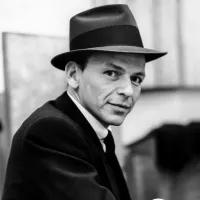
Frank Sinatra nicknamed Chairman of the Board and Ol' Blue...
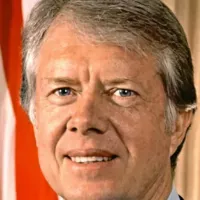
Jimmy Carter the th U S President - was a...
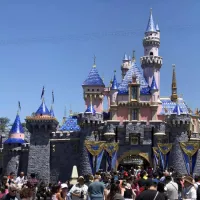
Disneyland located in Anaheim California is the first theme park...
China officially the People's Republic of China is an East...
Trending
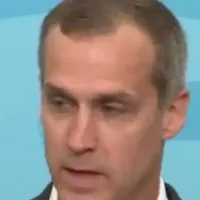
41 minutes ago Kristi Noem faces affair allegations as questions arise about Corey Lewandowski relationship.
42 minutes ago Broadcom Earnings Anticipated Amid Tech Stock Breakout Predictions and Growth Stock Hopes.
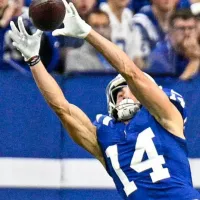
42 minutes ago Alec Pierce expresses love for Indy while considering exploring free agency options.

42 minutes ago Antoine Semenyo's impact: A key January addition boosting Man City's title pursuit.
2 hours ago HBO's Lanterns Trailer: John Stewart's Training, Hal Jordan's Suit, and Kyle Chandler
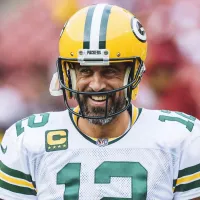
2 hours ago Aaron Rodgers' Potential NFL Free Agency Destinations: Steelers Update and Team Fits.
Popular

Ken Paxton is an American politician and lawyer serving as...

Hillary Diane Rodham Clinton is a prominent American politician lawyer...

Jesse Jackson is an American civil rights activist politician and...

Jim Carrey is a Canadian-American actor and comedian celebrated for...

Bill Clinton served as the nd U S President from...

XXXTentacion born Jahseh Dwayne Ricardo Onfroy was a controversial yet...
